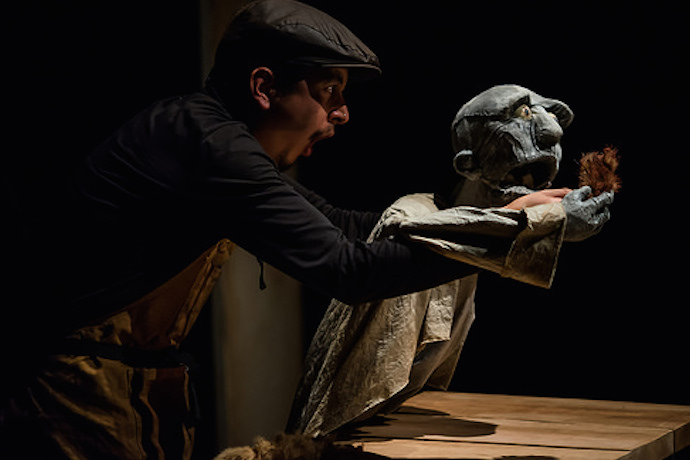
Wilton’s Music Hall, London
By Kate Romano
‘I don’t have dreams’ sang Tarrare, plaintively: ‘I just want to be full’. The new puppet-opera from brothers Tobi and Tom Poster told the 18th century tale of Tarrare, a diagnosed polyphagist (someone with an excessive desire to eat), a ‘tiny man’ with a voracious appetite for anything in sight: stones, chains, live snakes, fluffy cats. Tarrare’s plea seemed simple enough, yet this disturbing work took the audience deep into disquieting issues of acceptance, normality and the culture of entertainment.
It’s hard to think of a more fitting setting than the timeworn Victorian beauty of Wilton’s Music Hall. The ghosts of entertainment-past tugged uncomfortably at the opera’s voyeuristic freak-show context. The Depraved Appetite of Terrare the Freak, presented by Wattle & Daub figure theatre company, was as twisted as Wilton’s wooden corkscrew columns, as dark as its theatre-blackout and as pathos-laden as its faded grandeur.
Tarrare straddles a point somewhere between opera and music hall. It had strong melodies (Tom Poster displaying a true gift for memorable musical lines), compelling performances, love, tragedy. It even had an all-hands-on-deck rousing chorus before the interval as Tarrare set off to join the French Revolution. But Tarrare also had elements that were – even by the improbable standards of opera – quite hard to stomach. Amidst the autopsy, the retching, the vomiting, the defecating, the gasping was a profoundly tragic story of despair, cruelty and humiliation. ‘I tried to cure him’ sang the doctor, ‘yet I did not understand him’. Only Celeste, one half of a pair of conjoined twin-sisters, understands Tarrare. Her love for him lead to her death and inevitably to her sister’s, who dies contemplating the impossibility of life without her twin.
This was a creatively resourceful production; singers Michael Longden and Daniel Harlock leant a generous array of voices to the puppet cast, encompassing everything from a particularly moving falsetto to rich baritone. The puppets were mostly ragged torsos with skeletal faces, capable of delivering a rich wealth of emotions. But it was Tarrare who exuded a constant uneasy tension between his horrific actions and his pained, doleful eyes.
Puppetry – and indeed opera – often has the effect of distancing the audience from whatever horror is depicted, yet in this case the distance felt uncomfortably small. Tarrare was not an easy watch yet at its heart was an important and relevant question: how does society respond and relate to those whose actions we can never truly understand? ![]()